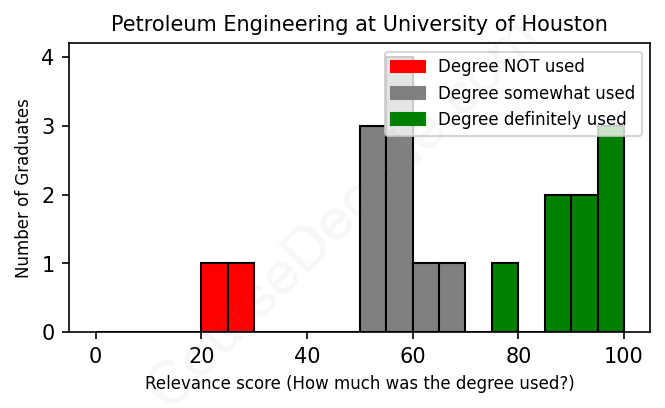
First, some facts. Of the Petroleum Engineering graduates from University of Houston we've analyzed , here's how many have used (or NOT used) their degree in their career:

These are estimates based on AI analysis of 19 LinkedIn profiles (see below).
The verdict? On par with the average. Overall, with an average relevance score of 67%, Petroleum Engineering graduates from University of Houston have about the same likelihood of finding work in this field as the average graduate across all fields:
And for comparison, here's the chart for all profiles we've looked at across all degrees.
Also, after graduating, only 21% of these graduates have pursued further education other than another Bachelor's degree (such as a Masters degree or other), compared to the average across all profiles of 35%. This suggests a Bachelors degree is enough for most Petroleum Engineering graduates, and it's normal to look for work straight after graduation.
See the details:
|
Relevance score: 66% We think this person has gone into a career only somewhat relevant to their degree. We think this person has gone into a career only somewhat relevant to their degree.
DEGREE INFOGraduated in 2021 from University of Houston with a Bachelor of Science - BS in Petroleum Engineering. Also pursued further education since (see below). JOB HISTORY SINCE GRADUATIONCementing Field Engineer Schlumberger Jul 2021 - Jul 2022 Integrity Engineer I  Wood Jul 2022 - Present FURTHER DEGREES DONE SINCE GRADUATINGMaster of Science - MSTexas A&M University 2022 - 2024 ABOUTEngineer with a history of working in oil and gas and the management consulting industries. Skilled in risk based inspecting planning, visual inspections, and corrosion analysis. Currently, I work with a team of engineers and technicians to perform inspections, assessments and repairs of critical equipment and structures as Integrity Engineer I at Wood. |
The top 10 most common jobs done by the graduates we've analyzed (ranked most common to least) are:
When analyzing the job profiles of graduates from the University of Houston with a degree in Petroleum Engineering, it seems like the most common types of jobs tend to be in roles like Field Engineer, Petroleum Engineer, or various technician positions in the oil and gas sector. Many graduates have found positions that directly apply their technical skills in areas such as drilling, production, and project management, which align closely with their educational background. For instance, roles like Petroleum Engineer at Gaither Petroleum, Field Service Technician at NOV, and Hydraulic Fracturing Engineer at ProPetro are all positions that require a solid understanding of petroleum engineering principles, and they show that graduates are indeed utilizing their degree in relevant fields.
However, not every job listed is closely tied to petroleum engineering. Some roles, like project management positions or data analysis jobs, though they might have a tangential link to the oil and gas industry, do not demand the same core engineering skills daily. There’s a fair number of graduates who have taken roles that seem less focused on the petroleum engineering field and more on business or general engineering principles. So, while many alums have landed jobs that leverage their petroleum engineering education effectively, there are also plenty who have veered off into roles that are somewhat related at best. Overall, it looks like a good number of graduates are getting to use their degree in relevant ways, but there’s also a significant slice of the pie where the connection isn’t as strong.
Here is a visual representation of the most common words in job titles for Petroleum Engineering graduates (this is across all Petroleum Engineering graduates we've analyzed, not just those who went to University of Houston):

Looking at the career trajectories of graduates in Petroleum Engineering from the University of Houston, it seems like many of them have started off in relevant roles right after graduation. For instance, a lot of graduates took internships or entry-level positions related to petroleum engineering, like being field engineers, project managers, or working in service companies like Halliburton and Schlumberger. Those first jobs typically involve hands-on technical work or support roles in drilling, operations, or engineering positions. This pattern suggests that graduates are getting their foot in the door in the petroleum sector, which is pretty encouraging if you're thinking about following a similar path.
Fast forward five to ten years, and many graduates have moved into higher-level positions while remaining within the industry. We see roles like project managers, senior engineers, and even CEOs popping up in their LinkedIn profiles. However, it's worth noting that not everyone has stuck strictly to petroleum engineering; some have transitioned into business roles or different engineering fields, which could indicate a bit of diversification given the ups and downs of the oil market. Overall, it looks like a decent number of graduates are able to carve out solid careers in the petroleum sector, although a handful have ventured into unrelated fields. So, if you're considering a degree in Petroleum Engineering, it seems there are good opportunities, at least for those who are proactive and willing to adapt.
Alright, so a Bachelor’s degree in Petroleum Engineering can be pretty challenging, and the program at the University of Houston is no exception. It’s definitely more demanding than some other degrees because you’ll be diving into some tough subjects like thermodynamics, fluid mechanics, and reservoir engineering. You’ll also have to tackle a lot of math and physics along the way. But it's not impossible—if you stay organized, put in the effort, and get help when you need it, many students make it through just fine. Overall, expect a rigorous program with plenty of late nights and tough exams, but it's also super rewarding if you're passionate about the field!
Most commonly, in the LinkedIn profiles we've looked at, it takes people 4 years to finish a Bachelor degree in Petroleum Engineering.
Looking at the job paths of these Petroleum Engineering grads from the University of Houston, it seems like they’re generally doing pretty well in terms of making money, especially compared to many other fields. The earlier graduates often started in roles that seem solid, like engineering positions and project management, and they’ve moved into more senior roles over time, which usually comes with better pay. For example, someone transitioned from being an intern to a Reservoir Engineer and then to an Associate at a financial firm, which likely pays quite well. While some of the more recent grads are still getting their feet wet with internships or entry-level roles, those positions are often stepping stones to more lucrative careers in this high-demand field. Overall, I’d say these folks have a decent shot at earning good money as they gain experience and advance in their careers!
Here is a visual representation of the most common words seen in the "about" section of LinkedIn profiles who have a Bachelor degree in Petroleum Engineering (this is across all Petroleum Engineering graduates we've analyzed, not just those who went to University of Houston). This may or may not be useful:

Here are all colleges offering a Bachelor degree in Petroleum Engineering (ordered by the average relevance score of their Petroleum Engineering graduates, best to worst) where we have analyzed at least 10 of their graduates:
| College | Score | Count |
|---|---|---|
 Texas A&M University Texas A&M University
|
80 | 25 |
 Louisiana State University Louisiana State University
|
79 | 26 |
 University of Oklahoma University of Oklahoma
|
78 | 20 |
 Texas Tech University Texas Tech University
|
77 | 20 |
 Penn State University Penn State University
|
75 | 11 |
 The University of Texas at Austin The University of Texas at Austin
|
75 | 18 |
 Marietta College Marietta College
|
70 | 20 |
 Colorado School of Mines Colorado School of Mines
|
69 | 30 |
 West Virginia University West Virginia University
|
68 | 10 |
 University of Houston University of Houston
|
67 | 19 |
 University of Louisiana at Lafayette University of Louisiana at Lafayette
|
63 | 10 |